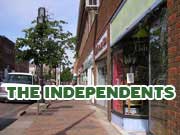| The Independents |
Co-ops help keep rural towns alive
August 4, 2004
 |
| Vesta community members, such as these retired farmers, teamed up to open the Vesta Cafe a year ago. The co-op cafe was built with volunteer labor and paid for by donations from the community. (MPR Photo/Annie Baxter) |
Vesta and Echo, Minn. — The Vesta café is a perfect postcard picture: country knickknacks, like teacups and tiny plastic apples decorate the walls, and the smell of strong coffee fills the air. At three in the afternoon, business is brisk. A group of retired farmers plays a cut throat game of cards in the corner.
"Sometimes they almost kill each other just for a quarter," one farmer jokes.
A few feet away sit three Vesta ladies, exchanging gossip over slices of lemon meringue pie. They say they're here at least once a day.
"I think it was three times today for me," one woman admits.
 | |||
For decades, a café next door was the local hangout. It closed nearly three years ago. The cafe seemed to have plenty of customers, so locals guess it wasn't well-managed.
Carole Jordan works at the new café and she waitressed at the old one, too. She says when it closed, she lost more than just a job.
"The town died without a café," Jordan says matter-of-factly. "There were no cars on the street. I said pretty soon the tumbleweeds will be blowing down the street."
Once the café closed, that brought the number of empty storefronts to four -- half the businesses on the street. The farmers who play cards had nowhere to go. Sometimes, they'd resort to setting up a card table in the liquor store.
Finally, people in town took action. They pooled their resources together to build this cafe. Dan Holmberg has lived in the area all his life. He was one of the organizers.
|
The town died without a café. There were no cars on street. I said pretty soon the tumbleweeds will be blowing down the street.
- Carole Jordan, Vesta Cafe waitress |
"A lot of people got their heads together and decided maybe we can build this thing if we get donations. So we asked for donations from the community, and I think we put about $90,000 together. It was all volunteer labor, except for the electrical. I think it took about 8 months to build the place, but I think we did a good job," Holmberg says.
The community founded a non-profit organization to pay for the café. Then they interviewed potential managers, and decided to lease the business to Yvonne Ellis. She and her husband run the operation now.
If it weren't for this cafe, Vesta residents would have to drive about 20 miles to Redwood Falls or Marshall for a restaurant. But it's not the commute that really bothers people. The town needs a café for reasons that go beyond convenience, according to the local bank's loan officer, David Widman.
"If we don't have this, we're not gonna have a community," Widman asserts. "This is what's facing small towns throughout the Midwest."
Vesta has a lot in common with its neighbor Echo, just five miles up the road. The town's about a mile wide and a mile long, with a crush of abandoned buildings at the center.
Echo residents Nancy Harvey, Corlys Chase, and Guila Kurtz point to the town's landmarks, or what remains of them.
"The grocery store just closed in December," Kurtz notes.
"And didn't that used to be a hotel?" Harvey asks. "There's nothing in there now, I believe."
 | |||
"The pool hall had been there for years and years and years. But it's been vacant for a long time. Someone lived on the second floor," Chase says, shaking her head.
"So you see, there's vacant buildings everywhere. And that's what we don't want," Harvey concludes.
These three women are shaking things up in town. When the grocery store closed last year, they were spurred to do something about it. They're part of a group of mostly retirement-age women who raised enough money to build the town a new store.
It turns out, they're familiar with the do-it-yourself approach. A few years ago, the public school closed down, and people in town got together to open a charter school. Since then, attendance has more than tripled.
Guila Kurtz says people in Echo learned a lesson from the school, and they're applying it to the grocery store.
 | |||
"No one is going to do it for us. We decided to take over! God helps those who help themselves, right?" Kurtz says with a smile.
More and more rural towns are coming to the same conclusion. In fact, Minnesota has more than 1,000 co-ops. It's one of the leading states embracing the cooperative business model.
The store in Echo will be non-profit and small-scale. They'll keep a limited inventory of items like milk, cereal, and coffee. And it will bear the apt name of Hope Market.
"One thing that's happened since we started this grocery store, is that there have been people who are interested in starting other businesses in town," Nancy Harvey says. "That's gonna bring in other income, it's gonna be good for the city -- to help the town start thriving again." So far, no other new businesses have opened up. And at this point, Hope Market is still an empty lot marked off by some plastic orange fencing. But construction is supposed to move fast, and the market should open this fall.
|
News Headlines
|
Related Subjects
|

